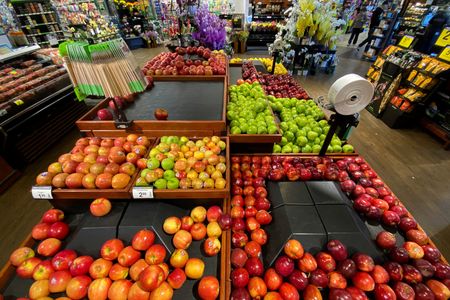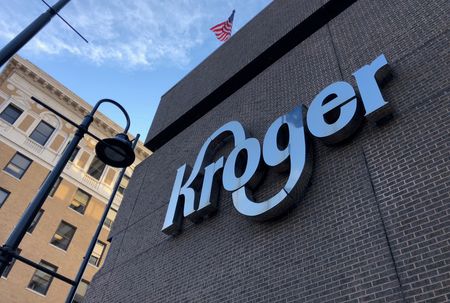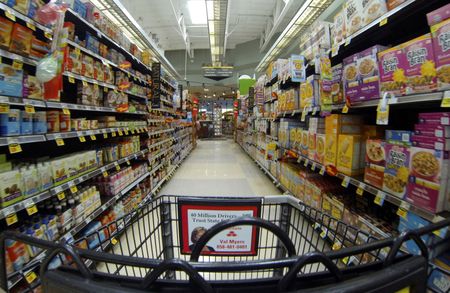


By Arriana McLymore and Siddharth Cavale
NEW YORK (Reuters) – The $25-billion merger of Kroger and Albertsons could ultimately lead to lower prices for shoppers, at least according to a plan laid out Friday by Kroger’s CEO.
In an interview with Reuters, Kroger Co CEO Rodney McMullen said the savings provided by the deal would allow the chains to cut prices for consumers. He cited $500 million of “cost savings from synergies” that the new entity could use to lower prices.
McMullen said the combined entity could better compete head to head with “larger, non-union” grocers – a reference to players such as Walmart Inc and Target Corp, both of which also sell groceries.
The merger, once complete, would create a supermarket titan with more than 5,000 stores including banners such as Ralphs and Fred Meyer, as well as other regional supermarket chains with mostly unionized workforces.
Prices are top of mind for shoppers right now, with inflation at multi-decade highs.
A Reuters review of a basket of goods on Kroger’s website found it generally charges more for essential groceries such as rice, sausages and bread than Walmart does.
A 14-ounce packet of Minute white rice is $2.99 at Kroger.com versus $2.14 on Walmart.com, while six beef franks from Hebrew National fetch $5.49 at Kroger.com versus $5.18 on Walmart.com. A 20-ounce packet of Sara Lee Classic White Sandwich bread goes for $2.50 at Kroger, compared to $2.24 at Walmart.
Having a union workforce could be an advantage for the combined Kroger-Albertsons in a tight labor market. Nearly two-thirds of Kroger’s 2,700 stores are unionized, like a “majority” of Albertsons stores, the United Food and Commercial Workers Union says on its website.
Unionized workers across all industries were paid more than non-unionized workers in 2020 and 2021, according to the U.S. Bureau of Labor.
Walmart’s clout with suppliers such as Procter & Gamble and Conagra often lets it demand the lowest prices on goods. Grocery stores such as Kroger, Albertsons, in contrast, are often forced to rely on coupons or buy-one-get-one-free promotions funded by companies like P&G and Conagra in order to compete.
Responding to inflation, many suppliers have cut back on the funding they dedicate to discounts and price promotions, according to Mike McShane, vice president of procurement and profit centers at URM Stores Inc, a grocery cooperative serving stores in Washington, Oregon, Idaho and Montana.
Walmart’s “everyday low price” strategy has helped it rank as the No. 1 seller of groceries in the United States, even though its business model is more akin to a mass-merchandise retailer. Euromonitor data shows that 25.2% of all dollars spent on groceries in the United States last year went to Walmart, while Kroger got 8.1% and Albertson’s 4.8%.
Kroger on Friday said that it would also invest in its private-label or store-brand products, which brought in nearly $28 billion of Kroger’s sales in 2021, a way to offer more cheaper alternatives to shoppers.
Analysts say private-label could be a key factor in differentiating itself from rivals including Walmart, Target and the Dollar stores, which offer fewer store-brand grocery options.
If the combined entity can lower its prices, it might be able to reach more lower-income shoppers. The median household income for an Albertsons shopper is $83,000, while the median income for Kroger shopper is $77,000, according to data from Numerator. Walmart shoppers have a median income of $73,000.
The merger is expected to be completed in 2024.
(Reporting by Arriana McLymore, Siddharth Cavale and Jessica DiNapoli in New York and Richa Naidu in London; Editing by Nick Zieminski)

